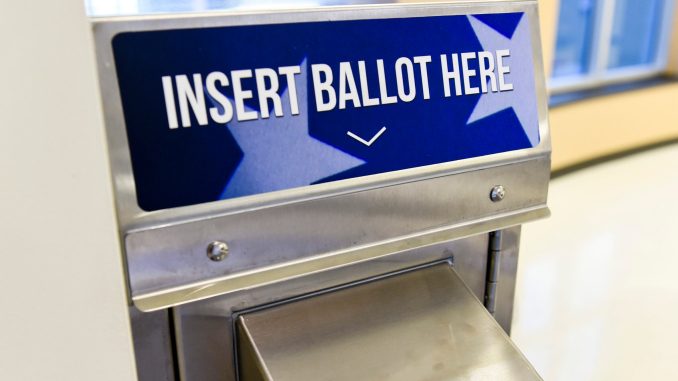
Litigation in Pennsylvania could change election procedures in one of the most closely watched battleground states in the country.
In 2020, Joe Biden won Pennsylvania by about 80,000 votes statewide, beating Donald Trump’s 2016 victory margin in the state by about 45,000 votes.
This year, the seats of outgoing Pennsylvania Gov. Tom Wolf, a Democrat, and outgoing Sen. Pat Toomey, a Republican, are up for grabs in the Nov. 8 elections.
Here’s a look at three key lawsuits brought in September in the commonwealth.
1. Ballot Drop Boxes in Philadelphia Suburb
Pennsylvania essentially has a one-voter, one-ballot rule, meaning election law requires mailed and absentee ballots to be returned either by mail or in person by the voter to whom it belongs.
State law stipulates that each voter is allowed to place only his or her own ballot in a drop box, not the ballots of other voters.
However, according to the America First Legal Foundation, a security camera captured more than 330 individuals depositing multiple ballots into drop boxes during the state’s primary election in June. Under Pennsylvania law, this would make the ballots void and invalid, the legal foundation notes.
The America First Legal Foundation sued the Chester County Board of Elections on behalf of four county residents, to compel immediate compliance with Pennsylvania law governing ballot drop boxes.
Chester County has 13 authorized ballot drop boxes. County officials monitored 11 of them to ensure compliance with the election code. But that left two drop boxes that were not monitored and were accessible around the clock, day after day, according to the plaintiffs complaint.
The legal foundation is asking the court to require the county election board to see to it that all drop boxes are monitored in person to ensure that they are used by only one person at a time delivering his or her own ballot. Doing so would fulfill the election board’s statutory duty to ensure that void and invalid ballots aren’t commingled and counted in future elections, the foundation argues.
“America First Legal continues its civil rights crusade by defending the integrity of the franchise,” former Trump adviser Stephen Miller, the foundation’s president, said in a public statement. “Surveillance video shows widespread illegal use of ballot ‘drop boxes’ with multiple ballots being deposited—also known as vote trafficking—in flagrant violation of law.”
Chester County election officials did not respond to The Daily Signal’s inquiries for this report.
2. GOP Challenges Ballot ‘Curing’
This month, the Republican National Committee joined a lawsuit brought by 12 Pennsylvania voters against the state for not having a uniform statewide standard to “cure” a defective absentee ballot and thus conducting “illegal and unfair” ballot counts.
Some Pennsylvania counties allow for ballot curing, the practice of allowing election workers to try to determine a voter’s intent if an absentee ballot is unclear. Examples include when two candidates’ names seemingly are marked, a ballot is ripped, or a candidate’s name is only marked vaguely.
The lawsuit contends this isn’t allowed under Pennsylvania law, and that curing is a secretive process.
The lawsuit claims the Pennsylvania Legislature is responsible for setting procedures that apply consistently across the state because the U.S. Constitution specifies that state legislatures should set the rules for how elections are run.
Wolf vetoed a bill passed by the GOP-controlled Legislature to remedy this issue, the suit notes, so it’s necessary for Republican groups and citizens to ask the court to standardize elections in Pennsylvania.
The defendants are Leigh Chapman, acting secretary of the commonwealth; Jessica Mathis, director of the state Bureau of Election Services and Notaries; and the counties of Adams, Allegheny, Armstrong, Bedford, Berks, Blair, and Bradford.
“Pennsylvania Democrats, led by Gov. Tom Wolf, are unconstitutionally flouting the law by failing to adopt uniform rules for how elections in the Keystone State are run,” RNC Chairwoman Ronna McDaniel said in a prepared statement. “This lawsuit will ensure that Pennsylvania voters have confidence in their elections, and underscores the Republican Party’s commitment to making it easier to vote and harder to cheat in Pennsylvania and nationwide.”
Neither the Secretary of the Commonwealth’s Office, which supervises elections nor the state Attorney General’s Office, which handles legal matters, responded to multiple inquiries from The Daily Signal for this report.
3. Temporary Halt on Drop Boxes
Lehigh County District Attorney Jim Martin found more than 288 people put more than one ballot into a drop box during the November 2021 election.
An investigation determined that 3,695 ballots were deposited in drop boxes, even though only 2,756 persons dropped ballots into those same boxes.
The Lehigh County Board of Elections agreed to stop using ballot drop boxes eight days after a lawsuit was filed by America First Legal Foundation.
The legal foundation sued to compel the Lehigh County Board of Elections to monitor the county’s drop boxes to ensure that a voter, or a legally authorized representative, placed only his or her own ballot \into the drop box.
Under a court-approved agreement, the county also agreed to refrain from accepting certain mailed and absentee ballots until a court hearing is held Oct. 7 on the legal foundation’s motion for a preliminary injunction.
The Pennsylvania Alliance for Retired Americans, represented by Democrat election superlawyer Marc Elias, filed a motion to intervene in the case. The group challenged the agreement, asserting that drop boxes “are critical for voters … who are unable to vote in person because of disability, scheduling conflicts, lack of transportation, or other hardship, and who cast their ballot too late to rely on postal delivery.”
Lehigh County election officials did not respond to The Daily Signal’s request for comment on this report.
Have an opinion about this article? To sound off, please email letters@DailySignal.com and we’ll consider publishing your edited remarks in our regular “We Hear You” feature. Remember to include the url or headline of the article plus your name and town and/or state.

